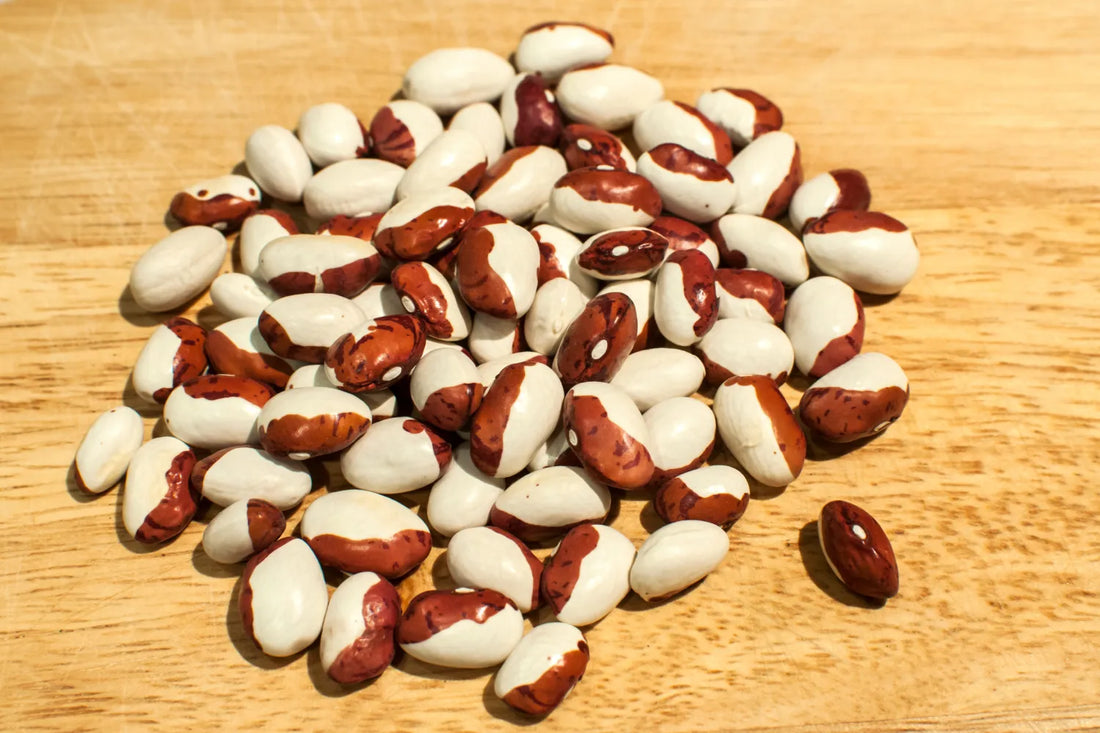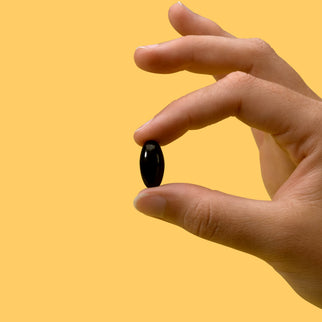If you’re on a quest for a sharp mind and a healthy brain, phosphatidylserine is a little-known compound that may be the secret weapon you've been searching for.
So, what makes phosphatidylserine truly stand out in the crowd? What health benefits does it offer, and how can it be incorporated into your daily routine for optimal brain health? We'll dive into these questions and more as we explore the exciting world of phosphatidylserine and nootropics.
What Is Phosphatidylserine?
Phosphatidylserine, though a bit of a tongue-twister, is a substance your brain will thank you for learning about. It’s classified as a phospholipid, a special type of lipid (fat) that forms a critical part of every cell membrane in your body. This isn't just any ordinary fatty substance — phosphatidylserine plays a crucial role in maintaining the integrity and fluidity of your cells, ensuring they function at their best.
How Does it Work as a Nootropic?
Let's talk about the world of nootropics. Nootropics, also known as "brain boosters" or "smart drugs," are compounds, either naturally occurring or synthetically produced, known to support cognitive function.
As a nootropic, phosphatidylserine brings a lot to the table as it helps to keep the brain functioning properly. For starters, it helps to maintain the health, integrity, and flexibility of cell membranes. By doing so, phosphatidylserine supports efficient signal transmission between nerve cells and maintains smooth communication within the brain.
It doesn't stop there, though — phosphatidylserine also supports the production of critical neurotransmitters, the chemical messengers that transmit signals across neurons and deliver instructions that help regulate everything from mood to muscle movement. By supporting their production, phosphatidylserine ensures that this delivery system works smoothly, further supporting communication and overall brain health.
How Is Phosphatidylserine Sourced?
Phosphatidylserine is a naturally occurring component in many foods we consume, though in relatively small amounts. Some of the richest sources include organ meats, specifically with livestock such as chicken and bovines. Other sources include soybeans, white beans, and egg yolks.
In the past, cow brains were a primary source of phosphatidylserine for supplements. However, the dietary supplement industry has pivoted away from this source. Instead, most phosphatidylserine supplements today are derived from plant sources, with soy lecithin being the most common.
Soy lecithin is a byproduct of the soybean oil production process. It's rich in phosphatidylserine and is a safer, more ethical, and more sustainable source than animal brains. It's also more acceptable to a wider range of consumers, including vegetarians, vegans, and those with dietary restrictions.
In addition to natural sources, phosphatidylserine can also be created synthetically — however, the natural form derived from soy lecithin is often preferred. The reason is that our bodies can more readily absorb and utilize the natural form, a trait known as bioavailability, helping to keep dosage levels low without missing out on the benefits.
What Are the 7 Nootropic Benefits of Phosphatidylserine?
Phosphatidylserine packs a punch when it comes to its benefits for your brain. Here are seven key benefits that make it a standout in the world of nootropics:
1. Support for Memory
Age-related memory impairment is a concern for many, but phosphatidylserine may provide some support. Research suggests that it might help support memory and maintain brain health, even with age. By supporting cell membrane health and neurotransmitter production, phosphatidylserine can help maintain cognitive function, making it a valuable weapon in the fight against cognitive decline.
2. Support for Overall Cognitive Function
Phosphatidylserine also supports proper neurotransmitter production and cell membrane health, critical factors in overall brain function. This can contribute to overall mental agility, reasoning, and problem-solving abilities.
3. Tension Relief
Stress is an inevitable part of life, but phosphatidylserine may help support a healthy stress response. Clinical trials suggest that this nutrient can support healthy cortisol levels, the body's main stress hormone. This effect can contribute to a sense of calm and relaxation, supporting mental health in our often hectic modern lives.
4. Maintained Focus
For many, staying focused can be a challenge, and phosphatidylserine may work to support overall feelings of focus and concentration thanks to the way it maintains brain function.
5. Sleep Support
Sleep is crucial for overall health and particularly for brain function. Sufficient phosphatidylserine levels in the brain can support the proper production of melatonin, the sleep hormone, potentially supporting sleep quality and duration.
6. Support for Athletic Performance
The benefits of phosphatidylserine aren't limited to the brain — it can also support physical performance. Studies suggest it can help ease feelings of muscle soreness and support recovery after intense workouts, making it a valuable supplement for athletes or anyone with an active lifestyle.
How Can You Incorporate Phosphatidylserine Into Your Daily Routine?
Depending on your diet, you’re probably already getting phosphatidylserine each day. However, using supplements can ensure that you’re giving your brain the optimal amount. For best results, general guidelines suggest taking 200 mg of phosphatidylserine per day. However, it's important to keep in mind that everyone is unique, and what works best for one person might not work as well for another.
Factors such as age, overall health, and specific goals or medical conditions can influence the optimal dosage for each individual. Therefore, it's best to discuss your needs and any potential concerns with a healthcare provider for specific medical advice before starting any new supplement regimen.
Are There Any Side Effects Associated with Phosphatidylserine?
The Food and Drug Administration (FDA) considers phosphatidylserine to be generally recognized as safe for most people. However, some individuals, particularly those taking doses over 300 mg, may experience minor side effects. These can include stomach upset or sleeping troubles. These side effects are typically short-term and should subside as your body adjusts to the supplement.
It's also important to note that phosphatidylserine can affect blood clotting. Therefore, if you're taking blood thinners for high blood pressure or have a clotting disorder, it's crucial to consult a healthcare provider before adding phosphatidylserine or any new supplement to your routine. This precaution ensures that the supplement won't interfere with your medication or exacerbate your condition.
What Are Some Other Supplements that Work Well With Phosphatidylserine?
While phosphatidylserine is a powerful nootropic on its own, it can also play well with others. Combining it with other nootropics can create a synergistic effect, enhancing the overall cognitive benefits.
Here are some supplements that can complement phosphatidylserine:
- Omega-3 Fatty Acids: These essential fats, particularly DHA, are crucial for brain health. They can enhance the effects of phosphatidylserine by supporting brain cell membrane health and optimal brain function.
- Ginkgo Biloba: This ancient plant extract is known for its memory-enhancing effects. When paired with phosphatidylserine, it may further support cognitive function and memory.
- L-Theanine: Found in green tea, l-theanine can help support relaxation without drowsiness. Combined with phosphatidylserine, it may help enhance focus and mental clarity.
- Ashwagandha: An adaptogenic herb, Ashwagandha can help the body manage stress. It may complement phosphatidylserine's stress-easing effects, promoting overall mental wellness.
- Acetyl-L-Carnitine: This compound can support proper energy production in brain cells. When combined with phosphatidylserine, it may help support optimal brain function and cognition.
The Takeaway
Supporting your brain health can feel complicated — but with the right supplements and nutrients, it becomes easy. As a key player in the world of nootropics, phosphatidylserine offers a wide range of potential benefits.
Phosphatidylserine's versatility and effectiveness make it a valuable addition to anyone's wellness routine. Whether you're looking to sharpen your memory, boost your focus, or simply support your brain's overall health, phosphatidylserine is worth considering.
However, remember that even the best journey is better with a companion. In this case, combining phosphatidylserine with other nootropics can enhance its effects, creating a synergistic boost to your brain health.
Specifically, consider exploring the plant-based omega-3 supplements that we offer here at iwi life. Our supplements, sustainably sourced from algae, can complement phosphatidylserine's benefits, providing additional support for your brain health journey. At iwi life, our phosphatidylserine is natural and plant-based, sourced from sunflowers.
So, why not take the first step towards enhanced brain health today? Place your order for our omega-3 Brain supplement with phosphatidylserine today and experience the benefits for yourself.
Sources:
Phosphatidylserine in the Brain: Metabolism and Function | PMC
Nootropics as Cognitive Enhancers: Types, Dosage and Side Effects of Smart Drugs | PMC
4 Foods High in Phosphatidylserine for Brain Health | livestrong
The Effects of Phosphatidylserine on Endocrine Response to Moderate Intensity Exercise | PMC
Effects of Phosphatidylserine Supplementation on Exercising Humans | NCBI Bookshelf


















